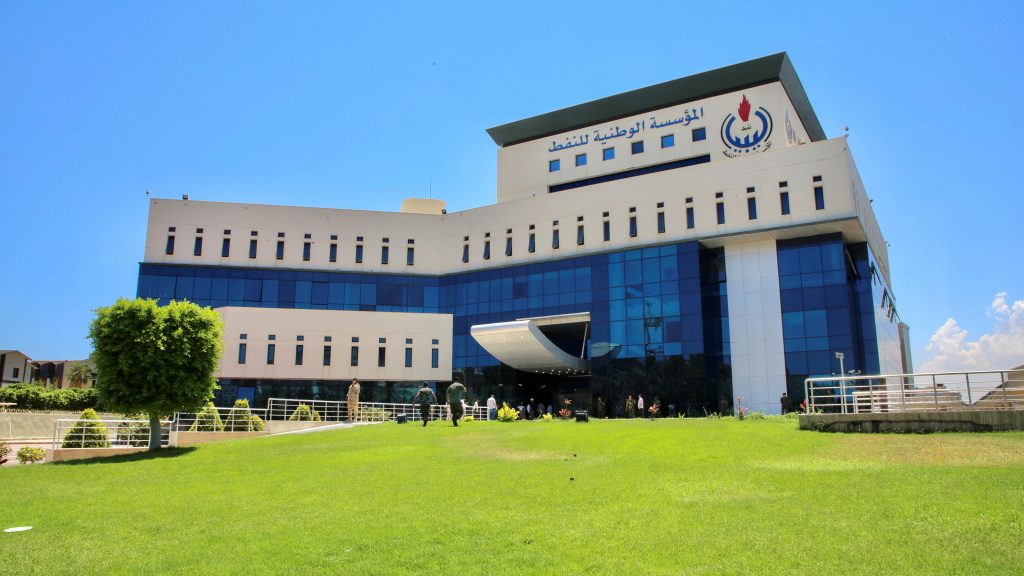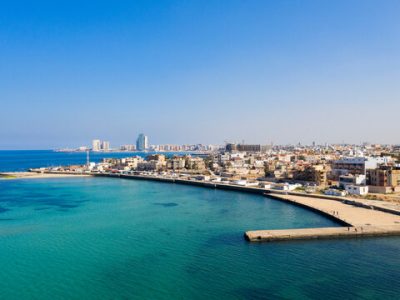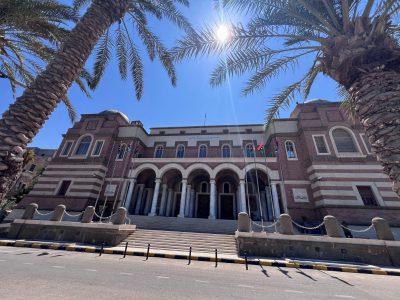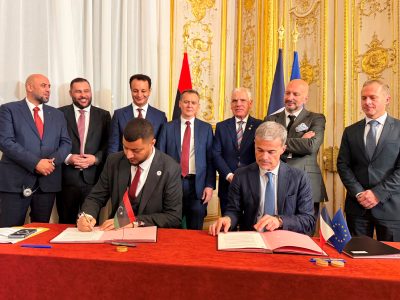Libya National Oil Corporation: Challenges and Reform Priorities
Libya’s National Oil Corporation (NOC) is a cornerstone of the national economy, accounting for the vast majority of exports and revenues. Oil and gas production constitute roughly 60% of Libya’s GDP and about 90% of government revenues, underscoring how public finances and foreign exchange depend on hydrocarbons. After years of conflict-related disruptions, oil output has rebounded to around 1.1–1.2 million barrels per day (bpd) in 2024–2025. Fluctuations aside, Hydrocarbon exports contribute nearly all of Libya’s export earnings and budget revenue, allowing salaries, public services, and essential imports to be paid. The NOC’s performance directly dictates national economic health, which is why its steady operations are a matter of strategic importance.
Yet Libya’s oil sector remains a high-risk lifeline. Production still falls short of the 1.6 million bpd achieved before 2011, and even the current ~1.2 million bpd level is precarious. Output can swing sharply due to facility shutdowns or security crises. This was seen in mid-2024 when a political standoff caused a temporary collapse to only ~0.5 million bpd. The NOC’s dominance in the economy is therefore a double-edged sword: it provides the bulk of Libya’s prosperity, but any shock to oil operations immediately reverberates through public treasuries and growth. Reducing this vulnerability will require not only keeping oil flowing, but also addressing structural problems that hamper the NOC.
Structural and Operational Challenges Facing the NOC
The NOC today operates amid serious infrastructure and capacity constraints. Decades of under-investment and conflict have left oil infrastructure in disrepair. Key pipelines and production facilities – many originally laid in the 1960s – are at the end of their lifespan. Pipeline issues are increasingly frequent: in one case, a major pipeline to the Zawiya refinery failed in mid-2025, halting crude supply for over two months. NOC officials have warned that extensive upgrades are urgently needed to sustain output. By late 2023, the NOC estimated that roughly $17 billion in new investment would be required to modernize infrastructure and raise production to a 2 million bpd target over the next 3–5 years. However, securing such funding has proven difficult. The corporation has faced budgetary constraints, with development projects delayed or scaled back due to limited capital allocation from the national budget and hesitant foreign partners. Efforts are ongoing to resume work on ageing infrastructure, but the pace of field redevelopment remains slow. This may hinder the NOC’s capacity to hit ambitious output goals. Management must carefully allocate scarce funds between patching existing infrastructure and investing in new capacity – a balance made harder by Libya’s political uncertainties.
Political interference and security risks pose another major challenge. The NOC strives to act as a neutral national institution, but Libya’s internal divisions have repeatedly disrupted its operations. Protests and armed blockades often target oil facilities as a form of leverage. For instance, the giant Sharara oilfield (capacity ~300,000 bpd) has been repeatedly shut down by local groups or militias pressing for jobs, regional development, or political demands. Each shutdown not only slashes output but also causes technical damage. Frequent halting and restarting of production degrades wells and pipelines, incurring costly maintenance. Nationwide, oil production has been disrupted repeatedly in the chaotic decade since the 2011 revolution. As recently as August 2024, a showdown between rival political factions over control of Libya’s Central Bank led to a month-long oil blockade that halved national output (a loss of ~700,000 bpd) and stopped exports from several terminals. Although production recovered by October, these incidents underscore the NOC’s exposure to political turbulence. The competing governments in Tripoli and Benghazi has at times put the NOC in a tug-of-war, with an eastern administration even threatening to relocate NOC’s headquarters and declare its own control over oil fields. Such interference risks fragmenting the industry and deterring the foreign investment needed for rehabilitation. NOC officials insist the corporation remains united and neutral, but protecting it from politicization is an ongoing battle.
The lack of consistent funding and financial autonomy hampers long-term planning. The NOC depends on state budget disbursements for its capital and operating expenditures. In recent years, stop-gap financing and ad-hoc “exceptional budgets” have been granted to the oil sector, but often without timely execution. In 2025 budget discussions, NOC leaders presented detailed funding needs for operations and field upgrades, urging that oil revenues be reinvested into maintenance and new projects. The Prime Minister’s office has likewise stressed that special oil sector funds must be used transparently for infrastructure and capacity expansion. Nonetheless, delays in approving budgets, coupled with competing political priorities, mean the NOC does not always receive the full resources it requires. This leaves critical projects languishing. The result is a cycle of reactive repairs and short-term fixes, rather than the proactive modernization program that Libya’s oil industry needs. Breaking this cycle will require insulating the NOC’s finances from instability and ensuring sustained investment in its assets and human capital.
International Engagements and Reform Priorities for the NOC
Despite the challenges, recent developments show the NOC actively seeking international partnerships and policy reforms to strengthen its performance. In late 2024, NOC leadership engaged in high-profile meetings with United States officials aimed at bolstering the corporation’s institutional stability. Chairman Farhat Bengdara’s visit to Washington resulted in U.S. pledges of support for the NOC’s independence and neutrality in the face of political pressures. American counterparts also offered technical assistance in areas like governance, transparency, and training for oil sector staff. This diplomatic outreach reflects a broader understanding that shielding the NOC from interference is critical for Libya’s stability. Likewise, the NOC has signaled commitment to global best practices and sustainability – for example, launching initiatives to curb methane and CO₂ emissions in line with a decarbonization charter announced at the COP28 climate summit. By engaging on energy transition goals, the NOC is trying to align Libya’s oil sector with longer-term trends while maintaining its core business.

At the same time, the corporation is pursuing new investment and expansion opportunities. After years of stagnation, Libya launched its first oil and gas exploration bidding round in 17 years, announced at an international forum in early 2025. Twenty-two exploration blocks across onshore and offshore areas were offered, quickly drawing interest from major global energy firms. This move to welcome back foreign investors is aimed at both boosting production and demonstrating that Libya is open for business after a decade of upheaval. To reinforce this, the NOC hosted bidding roadshows abroad – presenting opportunities in Houston and planning rounds in Istanbul and China – to attract partnerships and technology that can elevate output capacity. Major oil companies are cautiously returning: Italy’s Eni, for instance, signed a landmark $8 billion gas development deal with NOC in 2023 to tap offshore fields (with an expected 800 million cubic feet per day of gas production by 2026). Similarly, in mid-2025 the NOC reached an exploration agreement with Türkiye’s state oil firm (TPAO) to jointly survey four offshore basins. This Turkish partnership, focused on geological surveys in the Mediterranean, is strategically important – current output targets of 2 million bpd are unattainable without major new discoveries, and Libya’s underexplored offshore may hold the key. By collaborating with TPAO (and leveraging Turkey’s technical expertise), the NOC hopes to unlock new reserves while strengthening ties with a long-term ally. These international engagements are rebuilding confidence in Libya’s oil sector and injecting capital and know-how that the NOC alone cannot readily provide.
Meanwhile, the NOC is formulating a gas strategy to diversify energy sources and revenue streams. With Libya holding an estimated 53 trillion cubic feet of natural gas reserves, there is strong potential to expand gas production for both domestic power generation and export. The NOC has proposed developing large gas fields through innovative arrangements that bridge political divides. One recent proposal would create a new gas development company (nicknamed “Jelyana”) based in Benghazi to oversee a major project in western Libya’s NC-7 block – involving partners like Eni, TotalEnergies, the UAE’s ADNOC, and Turkey’s TPAO. Crucially, situating this venture in the east could help address regional grievances over oil revenue distribution, thereby reducing the likelihood of future shutdowns by eastern factions. Expanding natural gas output is also critical for Libya’s own needs: despite its oil wealth, Libya lacks refining capacity and currently imports large volumes of fuel. NOC leadership has warned that without new gas supplies by 2026, the country will remain reliant on costly fuel imports to keep the lights on. By fast-tracking gas projects and upgrading refineries, the NOC aims to both improve domestic energy security and free up more crude oil for export. Long-delayed downstream investments, such as the new 30,000 bpd South Refinery project in Fezzan, are also being revived to produce fuel locally and spur regional development. These initiatives point to a gradual shift: the NOC is not only looking to maximize immediate oil revenues, but also to diversify Libya’s hydrocarbon portfolio and add value through petrochemicals, power generation, and other downstream industries.
To capitalize on emerging opportunities, Libyan experts emphasize the need for a focused reform agenda that secures stable funding, rehabilitates infrastructure, and promotes diversification. Establishing a reliable financial mechanism that ring-fences a portion of oil revenues for operations and field development would allow the NOC to insulate critical projects from political budgeting cycles. This ensures the long-term certainty needed to rehabilitate infrastructure and expand capacity. A national program to upgrade oil infrastructure is equally vital, with priority given to replacing aging pipelines, modernizing terminals, and enhancing storage and refining facilities; addressing known bottlenecks such as the 1960s-era pipeline network would prevent costly outages while modern equipment improves efficiency and safety. At the governance level, the NOC’s neutral status must be protected through legal and political safeguards, with all Libyan parties committing to keep the oil sector out of factional disputes; external support, such as recent U.S. pledges, can reinforce transparent governance and help prevent politicization. Finally, diversification into natural gas and downstream industries offers a pathway to reduce reliance on crude exports. Fast-tracking gas field developments with international partners could meet domestic power demand and enable potential LNG exports, while investing in refining and petrochemical capacity, including the completion of the South Refinery and the upgrading of Ras Lanuf, would allow Libya to produce fuels and fertilizers at home, generate jobs, and shield the economy from oil price volatility.
By pursuing these reforms, Libya can reinforce the NOC as a driver of both short-term stability and long-term transformation. The stakes are high: oil revenues today fund the government and keep the economy afloat, but it is clear that business-as-usual is not sustainable amid aging infrastructure and political fault lines. The good news is that the NOC’s recent engagements and plans show a pathway forward. With the right policy support and governance reforms, the NOC can evolve from simply a source of cash into an institution that anchors national unity and enables broader economic diversification. In a country still recovering from conflict, the NOC remains a rare nationwide asset – one that, if managed prudently, can continue to stabilize Libya in the present while seeding the foundations for a more diversified and resilient future. The coming years will be pivotal: by solidifying the NOC’s independence and investing in its capacity, Libya can ensure its “economic lifeline” also becomes a springboard for growth beyond oil.




